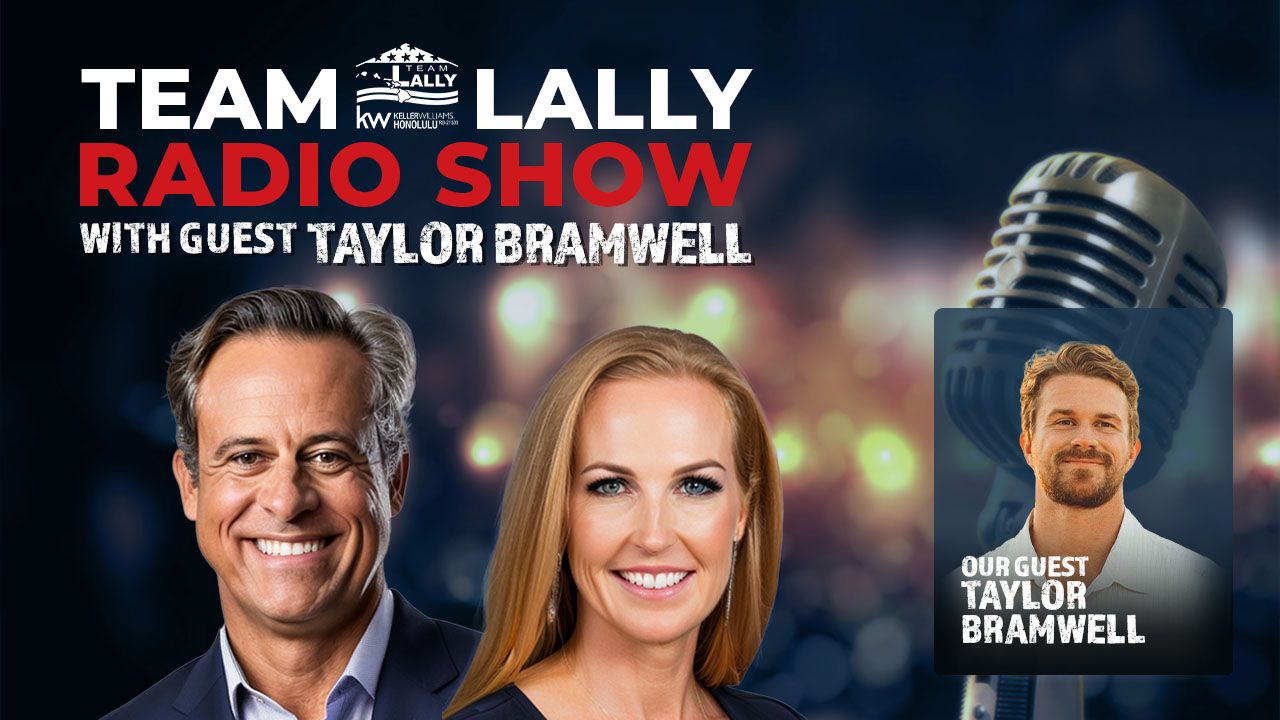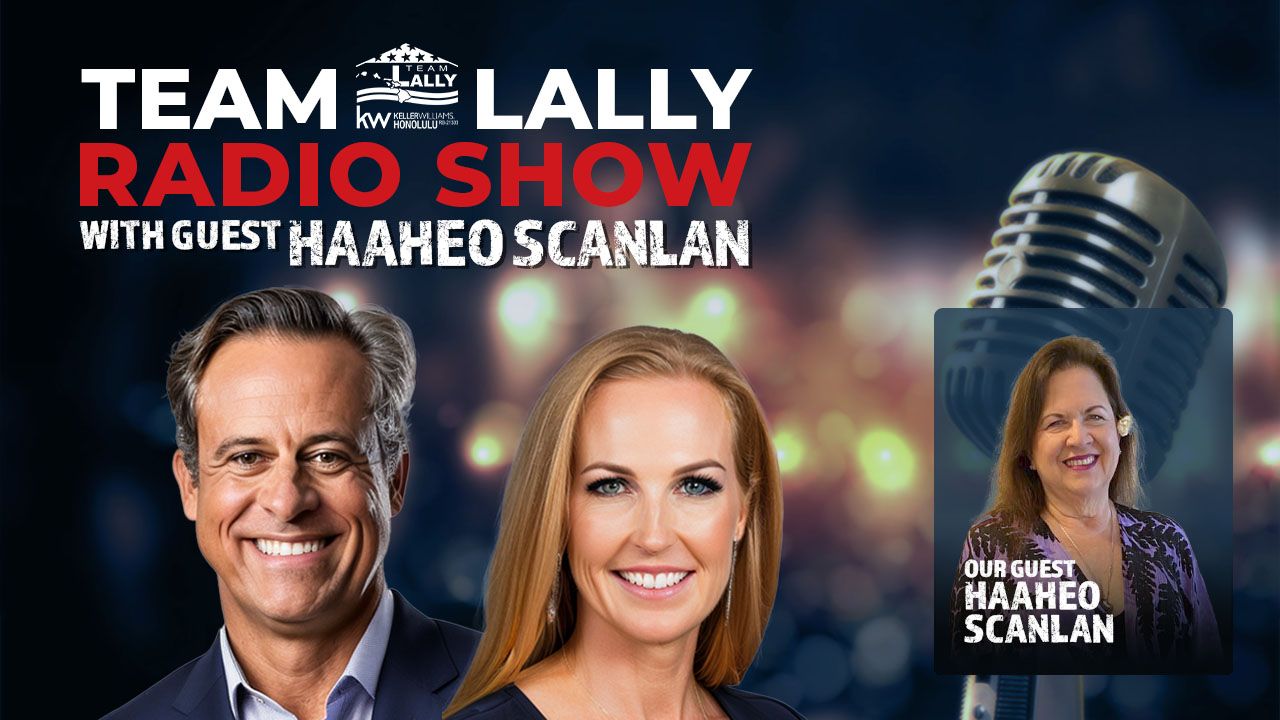We also have your favorite experts providing this week’s tips. Todd of LoanDepot answers one of the issues on high interest rates whether to pay or not to pay loan points. Amphay of Estate Planning Group of Hawaii tells us the importance of having an estate plan in place.
Watch or Listen to the full episode
Ready To Find Out How Much Your Home Is Worth?
Interview Transcription
ADRIENNE:
Welcome back. And thanks for listening to the Team Lally Real Estate show home of the guaranteed sold program or we’ll buy it I’m Adrienne and I’m Attilio and if you have any questions just give us a call at 799-9596 Or check us out online at Teamlally.com.
ATTILIO:
Our guest today is the President of Lima Charlie Inc. He’s been in the California real estate market for over 15 years, and has been involved in numerous residential reconditioning, construction, housing and rental management projects.
ADRIENNE:
He has served two tours in Iraq in support of opera Operation Iraqi Freedom, eight years in the United States Army, and is also a strong supporter of housing missions and revitalization projects throughout the states and federal government. Please welcome our guest, David Waldbauer.
ATTILIO:
Hey, David.
DAVID:
Hey, how’s it going? Thank you so much for having me on today.
ATTILIO:
Sure. Sure, sure. So all right, let’s just get right to it. What has gone all the way around the world and seems to have made news internationally, globally is the wildfires in Maui that completely destroyed the town of Lahaina and, and all the buildings there on Front Street. They as we speak, they’re still adding to the lives lost. And if you have family that are in the area, and haven’t been gotten a hold of, I just saw on the news today that the I think it’s the Department of Justice, they’re requesting if anybody has like DNA samples, like a hairbrush or something or a toothbrush from past family members that they can use to help identify the missing. So back to the Maui update and why we’re having you on the show. Adrienne, did you have a question for David?
ADRIENNE:
Well, I know we did our intro of David. But I want to take our listeners a little another step further. David’s partner Ron Cedillo from he’s we’ve known Ron for over 10 years. And Ron has an extensive background in mortgage investing, financing, and just really helping people. And Ron had reached out to us and was excited to share this program. And you know, really wanted our help in helping to make these connections and you know, to help the Maui people that have been displaced.
ATTILIO:
I think the key is that for Adrienne and I it’s an endorsement on our part of people that we know and trust to help the victims as well as property owners, they’re on Maui kind of navigate through all this stuff that might be not above board or a scam or that was good intentions. And so David, tell us, tell us, give us a description of this program that you guys are working with FEMA on for the people in Lahaina.
DAVID:
Yeah, absolutely. So it’s a really great program, it creates a win win. And FEMA enacts a long term housing plan for all survivors and natural disasters. And this can be any natural disaster within the nation. Currently, we’re working out of Florida, Louisiana, Kentucky, we’ve been in Vermont, we’re out of California. And now we’re working here in the local area of Maui. And we’re looking for homeowners and vacationers and anybody who might have property that’s available for rental purposes for 12, to potentially two years, to where we can put survivors in there. And it’s a federally assisted program that allows them to stay there. And the Fed, the federal government, FEMA pays for everything, the housing, utilities, everything so that the survivors can get back up on their feet. And they ask that a lot of the housing comes close to where the disaster occurred, so that it doesn’t impact the lives of the individuals that much so they could still get their kids to school.
ATTILIO:
Yeah, and then I mean, I can’t imagine there gonna be once as the infrastructure and, and construction and demoing starts happening, they’re gonna want to be going there to check on stuff and status and not be on the opposite side of the island to do so. But I
ADRIENNE:
would also encourage that if you do have a home on the opposite side of the island, please still submit your property because you never know.
ATTILIO:
Yeah, somebody’s like, Hey, I do want to live in Hana.
DAVID:
Because you never know I
ATTILIO:
was renting. And I just I just need to go somewhere different and put my put myself mentally, spiritually back together. Hana would be a great place to do that.
ADRIENNE:
So this program is for anybody, not just like homeowners, it’s for if you’re a renter, homeowner like, yeah, if you’ve been displaced, then this program will cover.
ATTILIO:
The first thing we got to put out to the people is you got to go and register with FEMA. FEMA is your ticket to this priority, called housing. And but right now you literally just, I mean, we’re this this program is all happening within the last 24 to 48 hours. And we’re looking at what maybe like 30,60 days out to get people in housing, but that’s better than 6,12. Two years. And so you guys are for the homeowners, what would be the concerns that you could address for the homeowners that are hearing about this program?
DAVID:
Yeah, concerns that they might have. So everybody that is a survivor is basically all vetted by FEMA. And then in addition, they’re vetted by us before they’re placed in the residence, and everybody gets a choice to house the person or not house. Yes, survivor. So, you know, the decision isn’t like, I’m opening up my house. And now I get some random people in there that I’m not approving, know, the whole process, you still have the entire control of your property. And it’s up to you, if you want to house the individual that has been selected for the house or not. So you still have control even though you’re offering your, your place or your you know, house to the survivors.
ADRIENNE:
David, when you say vetted like how do you mean, because I know we talked about this with our Keller Williams family agents. What exactly does that entail?
DAVID:
Yeah. So when you go through the FEMA application process, they know who you are, they know what your family sizes, your demographics, the things about you what had happened, but also when it comes through us. One thing that we do, we also do a background check on them as well. So we want to make sure that we’re getting the right quality of survivors, and to protect the homeowner as well. Yeah.
ADRIENNE:
So on these on these background checks, if you have like a history of like destroying your previous rental, someone like that probably would not be approved to be in the program. Yeah.
DAVID:
He would not be you would not be approved. Yes, absolutely. So the best interest is creating a win win. And, you know, even though we want to help the survivors, we still have to protect our homeowners as well. And that’s a priority.
ATTILIO:
And the rent. Walk us through how does house how where’s the rent coming from? And how does that work?
ADRIENNE:
And who goes on the lease? Yeah.
DAVID:
Exactly. Great point. So we at Lima Charlie, we signed the lease will be your tenant, and we make the payments on time, every single time. And then what we do is we go back to FEMA to get reimbursed, but we don’t want to put that on the homeowners. So we take that on upon ourselves. So you can you can guarantee that that payment is going to be there on the first of every month, you don’t have to worry about it.
ATTILIO:
Yeah, so if a mistake in six months, or eight months or nine months, you guys are getting that going. Now, if there was a if there was a FEMA, wildfire victim, they pass your background check, and you’ve got a homeowner that you can match them with, we’re not going to be waiting and waiting and waiting for the money to come through. You guys are gonna upfront that and get that all going. So
ADRIENNE:
I’ve got a I’ve got a question that I was just thinking about, because we’ve talked about this a lot on our radio show with our insurance agent and our property manager, Duke. Now, like you guys are signing the lease, but then you have the tenants that are there in there. Do you have them get some kind of renter insurance? How, you know, how does, how does that work for them to protect if something were to happen again?
DAVID:
Absolutely. So we have an insurance policy, we usually offer that up to the tenants at no costs. So limits rarely usually covers their tenant costs. Oh, nice. And so we get them a policy. And then, of course, as a tenant, we also get a policy. Yes. Perfect. So so we have a lot of the times we’re doubling covered.
ATTILIO:
Yeah. So it’s a win win. And that if you’ve got a vacation rental, that maybe all the bookings kind of disappeared, because of receptions or social media narratives that are going out there to the rest of the world for visitors. This would be a great way for you to help somebody on island, generate some income, make your mortgage payments, Win win all the way around.
ADRIENNE:
I just want to point out too, that David had mentioned on previous calls and meetings with vacation renter vacation rental units, we know that you’re used to getting a certain amount of income. And that’s going to be different than like a long term lease. Yeah. Now, David, can you explain what happens in that case? Like how do you go to FEMA to maybe get some kind of an adjustment? How does that work? Yeah, absolutely.
DAVID:
Yeah. So I mean, not only is an island, so and housing is expensive. And so FEMA realizes this, and so we so what we do is we gather up all the housing that we possibly can at whatever the prices are, and I know FEMA does a feasibility study. So they’re already aware of what the rates are. But there’s some flexibility in our program as Lima Charlie, on what we can and can’t do. And so we work with every homeowner. And we try to come to a good medium of, you know, how much is it? How much is the local cost? And how can we make this work? Because ultimately, if we can’t make it work, then there’s a survivor without a home. Yeah. And so we go out of our way to make sure that we can do everything possible to make sure that everybody is happy.
ATTILIO:
Yeah, let everybody know, what’s your track record on this? Y’all didn’t just come up with this yesterday and decide, Hey, let’s go do this over there in Maui. Tell us about your previous experience in this program.
DAVID:
Absolutely. So we’ve been in the business for a little over three years, we started in the Chico California fires in housing survivor victims from there. And we moved out to Louisiana after Hurricane Ida. And then we were out in Florida, we’ve been in Mississippi, Kentucky. And we’ve also are currently working in Vermont. So anytime there’s a natural disaster, and in this housing is needed for long term restructuring or repairing will be there. So we’ve we’ve been doing a lot lately.
ADRIENNE:
So you have experience. However, there’s something different about Maui. So like, what are your what is your plan? Or like, what do you need from, I guess, the community to help overcome some of these, you know, additional challenges we have with or without being on an island or
ATTILIO:
Keller Williams Maui agents?
ADRIENNE:
Yes.
DAVID:
Yeah so great points. Great question is that, obviously, Maui is an island. And so you know, we might be able to drive over in the mainland, and just check it out. But here on Maui, it’s really congested. There’s a lot going on, you know, we don’t want to get in the way. And we also there’s a lot of mistrust going on. So with the agents in the relationship, it’s really good to get that information out there to people that that trust and know you, in order to help them and give them the right information. And that’s why, you know, we made the call out, and we’re working with you on this one and, and why we’re on the radio show, because we’ve never done this one before. But we realize that the individual challenges with Maui, and we want to really get ahead of the game so that everybody can, can, you know, really benefit from this program?
ATTILIO:
Well, the faster we can establish that trust with the property owners, the sooner we can get properties on the list. And so, again, property owners go to, you can go to our website, because we have the link there, but fill out the form. And then typically, how long does it take for y’all to get a hold of somebody, once they fill out the form?
DAVID:
Yeah, once they fill out the form, we’re pretty quick will respond in an email or reach out to you, we add you to the list. Right now we’re compiling the list for the end of the month, and we’re going to submit it to FEMA. And then we should be reaching out to keep everybody that has filled out a form has availability and their housing, and keep them up to date on anything that we get. Because we realize that when your house is vacant, you have a pain there, you need to get a payment. So we want to make sure that we’re working with you and let you know that these are coming, and that we appreciate you.
ATTILIO:
So property owners, go to our website, check out that form. If you’re a victim out there, make sure that you are registered. For more go to our website registered with FEMA. You missed it or didn’t write it down and you want to give us a call. We’ll point you in the right direction. But number one priority with the victims get registered with FEMA so that the government the disaster relief, everything can start flowing your way and helping you guys get you guys lives back in order. All righty.
ADRIENNE:
Hey, thank you so much. Yes, David, thank you for being on the show. Was there anything that we didn’t touch on that you wanted to, you know, alert our listeners to? Yeah,
DAVID:
I don’t think so. I think we touched everything. And yeah, absolutely. It just, if you have available units, please reach out to us. And if you want to go for long term leases, and really help those survivors, getting out and making sure that your community is registered with FEMA, to let them know how many are needed. And then registering with us with your availability and housing. I think that’s the greatest thing that could happen and create a great win win situation for the long term, rebuilding of family.
ATTILIO:
All righty. Well, thanks, David, so much for being on the program and being one of these vendors for FEMA to help people in this community. Get it all put back together. Thank you so much.
ADRIENNE:
Thank you, David.
DAVID:
You’re so welcome. Thank you. Thanks for having me on today,
ADRIENNE:
of course.
Follow Us On Social Media
Looking For A Home in Hawaii?

Residential & Commercial Pest Solutions with Taylor Bramwell
This week on the Team Lally Real...

How Can PSI Seminars Transform Your Life with Haaheo Scanlan
This week on the Team Lally Real...


